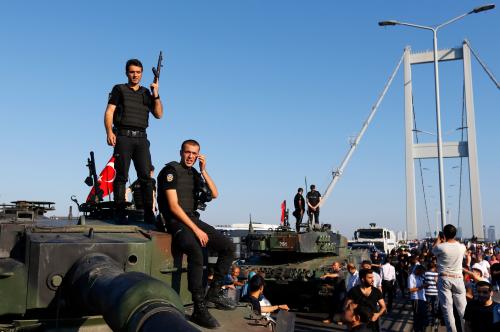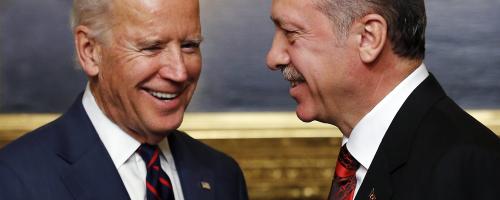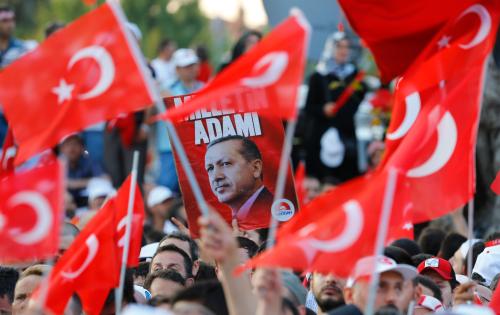Turks are angry with the West. Why, they ask, have there been no expressions of empathy for the trauma their country has suffered? Why has nobody applauded their successful defeat of a coup attempt and the stunning defense of Turkish democracy? Almost 240 people, mostly civilians, died during the coup attempt and its aftermath, and more than 3,000 were injured. Even more traumatic was the fact that the instigators assaulted the parliament building with F-16s and attack helicopters. Coups are not foreign to Turkey, unfortunately—yet, never has its legislative body been targeted like that.
In response to this shockwave in Turkey, officials in the United States and Europe have tended to be critical rather than sensitive. But striking a more sympathetic tone may actually help re-open space between the United States and European Union, respectively, with Turkey to discuss concerns about ISIS, refugees, and rule of law.
He said, she said
So far, official statements from the U.S. and European governments have focused on concerns about the rule of law in Turkey. There is also concern over Turkish President Recep Tayyip Erdoğan’s response—he called the coup a “gift of God,” for instance, and many observers (particularly in the West) have highlighted that he is using this gift to further consolidate his authoritarian rule. Given the recent less-than-stellar performance of Turkish democracy, especially in terms of media freedom, these concerns are understandable. A number of prominent and highly respected columnists in Turkey—including Taha Akyol, Murat Belge and Levent Gultekin—have repeatedly highlighted how poor democracy in Turkey is adversely affecting perceptions of Turkey abroad.
At the same time, opposition parties, the media, and leading civil society groups have unified behind the current government and have lent their support to Erdoğan’s Justice and Development Party (AKP). And Turkish TV channels are now broadcasting lively and extremely detailed debates on what to make of the coup attempt—the kinds of debates that the Turkish audience tends to love, but has not enjoyed for some time. On the one hand, these debates (which I’d encourage you to watch and/or read, if you have command of Turkish) scrutinize how Gülenist sympathizers penetrated state bureaucracies since the late 1970s and the military since the 1980s. On the other, they discuss how the incumbent government—as well as its predecessors since the 1990s—allowed this infiltration in order to advance their various agendas. Most participants in these debates stress the importance that rule of law be respected and that innocent people not be hurt. Most also emphasize that this is an opportunity to reconstruct Turkish democracy.
Some debate participants, in contrast, advance harmful conspiracy theories. Some assert that the United States was aware of the coup plot in advance—or even worse, was directly involved. The Turkish press is awash with exaggerated stories, and some of them quite viciously and unfairly attack Turkey experts from Washington-based think-tanks and research institutions. Their crime is evidently that they happened to be in Istanbul on the day of the coup to attend a conference (which had long been in the works) and that they have criticized the current government’s democratic performance in the past. That kind of ad hominem attack is of course unacceptable.
Why is this happening?
Turkey has a long-standing love-hate relationship with the West. The founders of the Turkish republic—as well as other leaders since then—have aspired to join Western institutions, model their political systems after Western democracies, and achieve similar economic prosperity. Yet at the same time, they often suspect that the West intends to harm and weaken Turkey. The West, unfortunately, has sometimes unwittingly provided fodder for this view: the lack of empathy, discussed above, is manifest in U.S. Army General Joseph Votel’s remark that the generals detained for their involvement in the coup were “allies” of the United States, for example. This creates a very awkward situation, with a U.S. general referring to renegade officers that mounted the coup, bombed the parliament, and caused many deaths as allies. That plays into the hands of those who allege U.S. involvement in the coup, and is disrespectful to the actual U.S. ally here, the Turkish government.
The U.S. government—after a (thankfully brief) period of hesitation—decided to call a spade a spade and condemned the coup unequivocally. However, many Turks were baffled that Secretary of State John Kerry urged “all parties” to exercise restraint on the night of July 15, apparently equating the instigators with the security forces of a legitimately elected government. There was an uncertain moment when one coup plotter—the Turkish commander of the Incirlik base, which Turkey shares with the U.S. military—sought asylum with his U.S. counterparts. His request was denied, but the move (coupled with the general conviction in Turkey, right or wrong, that the United States is shielding Gülen himself) helped fuel conspiracy theories, as preposterous as they may be.
Turkey has experienced a real trauma…and the country deserves credit for the way it stood up for democracy.
Changing the message
A delegation of Turkish parliamentarians was in Washington this week to meet with U.S. officials, members of the media, and think tank scholars—that’s a positive step. That the delegation did not include anyone from the Kurdish Peoples’ Democratic Party (HDP) is worrisome, but the visit did showcase how opposition parties have assumed responsibility as watchdogs, ensuring that the mistakes resulting from the dramatic and sweeping purges (about which the EU and United States are rightly concerned) are rectified and that rule of law is respected. The parliamentarians also recognized that conspiratorial accusations towards the United States are not helpful and that the rhetoric needs to be toned down.
In return, these and other Turkish lawmakers expect the terms of the extradition treaty between the United States and Turkey to be implemented. This is going to be quite a challenge. Whether Gülen is eventually extradited or not, however, the United States and Turkey’s European allies need to shift their public messaging to show that they’re sympathizing with the Turkish public and leadership. Turkey has experienced a real trauma—and from within its own military ranks, no less—and the country deserves credit for the way it stood up for democracy. Yes, the United States and the EU have concerns about what this coup attempt means for the international fight against ISIS and for implementing the EU-Turkey migration deal. But they should set these concerns aside for a moment, and publicly acknowledge that their ally of more than 70 years—since the USS Missouri sailed into the Istanbul harbor in 1946 as a show of solidarity with Turkey against Soviet Union’s territorial demands—is going through very turbulent times. Such gestures would create room for constructive criticism in support of the rule of law and democracy in Turkey. They could also re-open space to have a frank conversation about capital punishment, something some Turkish people are clamoring to reinstate, much to Europe’s dismay. A Turkey that got a little sympathy might in turn be a better partner in the anti-ISIS effort and better at managing the three million Syrian refugees within its borders (which could help ensure that they don’t move further into Europe). More sympathetic public messaging, in short, could go a long way in helping Turkey get back on track. The visit of the chairman of the Joint Chiefs of Staff Joseph Dunford was one step in the right direction, others should follow.
The Brookings Institution is committed to quality, independence, and impact.
We are supported by a diverse array of funders. In line with our values and policies, each Brookings publication represents the sole views of its author(s).








Commentary
Wanted: A dose of sympathy for Turkey
August 4, 2016